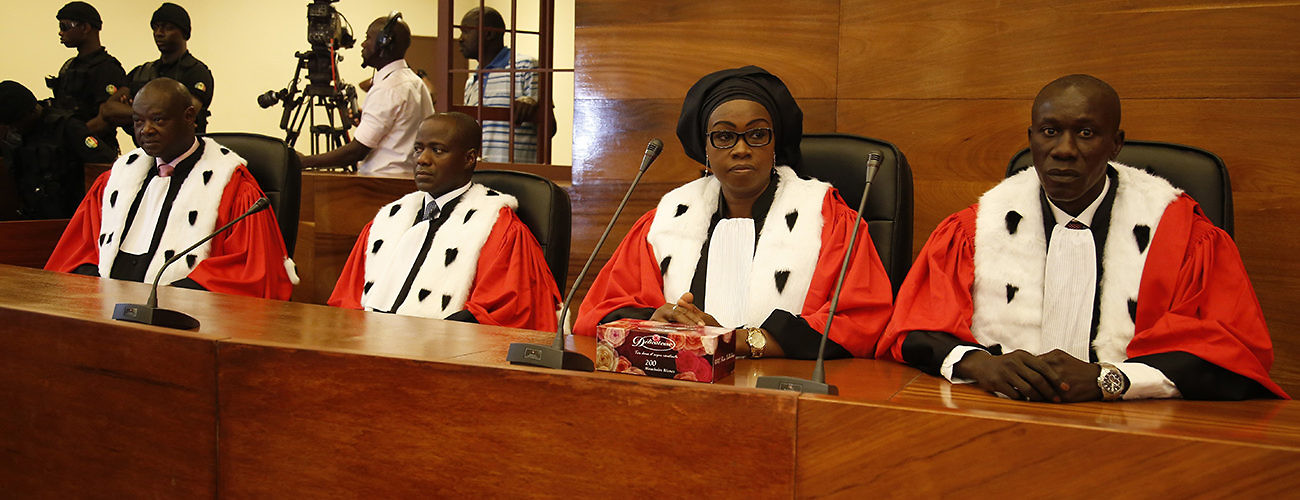Judges presiding over the trial of former Chadian dictator Hissène Habré. Dakar, Senegal, July 20, 2015. (Cemil Oksuz/Anadolu Agency/Getty Images)
In the past month, three states—Burundi, South Africa, and The Gambia—from three separate African regions have withdrawn from the International Criminal Court. Many see this as signifying a continental backlash against the court. Despite reassurance from self-proclaimed regional giant Nigeria, we might see a few more departures in the future. Russia, meanwhile, has also backed out of the court and the Philippines has indicated it may follow suit. This may further embolden African leaders.
The withdrawals follow a general recent trend of African non-cooperation with the ICC, largely sparked by investigations of Kenyan officials following post-electoral violence in 2007-08. These developments raise important questions about the future of international justice in Africa and whether there are alternatives for victims of crimes including genocide, war crimes, torture, and other serious offenses. There are no easy answers, but seeking them may benefit from a look at how we got here.
The ICC was established to try individuals who bear the greatest responsibility for international crimes where states are unwilling and/or unable to act. States still retain a greater ability and primary responsibility for bringing to justice most of those implicated in these crimes. Indeed, they may choose to try everyone suspected of committing international crimes irrespective of their level of responsibility. The challenge becomes much greater when the individuals involved are powerful and senior political office holders who can resist domestic legal action, as they often do. This justifies the accountability offered by the ICC.
Opponents of the court suggest that Africans can solve their own problems. They argue, for instance, that justice “made in The Hague” is far-removed for the many victims at home. They also claim that the court unduly targets Africa for prosecution—an accusation that is difficult to defend given the disproportionate designation of Africa states as “situation countries” by the court in the first place.
Against this background, it may be time to think about African regional—and, perhaps, continental—courts as complementary to the ICC and an equally important recourse for those seeking justice. Given the opposition to The Hague, alternative forums such as these may be the most realistic solution to the current situation.
Given constraints such as limited funding and political will, some regional courts have not done too badly in terms of developing jurisprudence. In 2011, the Court of Justice of the Economic Community of West African States (ECOWAS) invalidated prolonged pre-trial detention in Nigeria, thereby setting a precedent for member states. In another case involving Niger in 2008, it famously invalidated slavery. In May this year, the Extraordinary African Chambers established by the African Union in Dakar, Senegal, also convicted former Chadian dictator Hissène Habré of crimes against humanity, war crimes, and torture, including sexual violence and rape.
A dark spot for regional courts occurred in 2010 when the leaders of the Southern African Development Community shut down the organization’s tribunal after it issued a decision on land transfers in Zimbabwe that was considered unfavorable to prevailing political sentiments in that country. The Gambia’s effort to do the same within the ECOWAS court was, however, resoundingly defeated. Compliance with the decisions of these regional courts has been mixed overall, as noted by a 2010 report by the Open Society Justice Initiative that lamented “an implementation crisis” among institutions charged with protecting human rights.
Despite the challenges, regional courts could become increasingly important sites for victims of international crimes if provided better resourcing, clearer access points, and better overall support from governments. The AU has taken positive steps in this manner by offering an appropriate continent-wide forum in the reconfigured African Court of Justice and Human Rights. This institution—which will replace the existing African Court on Human and Peoples’ Rights once the relevant protocol achieves the required number of member state endorsement—has been given similar jurisdiction over international crimes to the ICC. It has attracted five of the 15 ratifications it needs to far.
Those supporting the new institution could learn from the existing African Court on Human and Peoples’ Rights’ difficulties in attract sufficient funding, establishing process, and ensuring compliance. There is also a serious question mark on the new court’s ambitious jurisdictional reach—as well as traditional international crimes, it seeks to exercise jurisdiction over issues including unconstitutional change of government; piracy; terrorism; mercenarism; corruption; money laundering; trafficking in persons, drugs, and hazardous wastes; illicit exploitation of natural resources; “aggression”; and the yet to be defined “inchoate offences.” Bearing in mind that it took the ICC several years to get its first conviction, even with a more limited jurisdiction, the new proposed African court faces an uphill task.
Nonetheless, it remains sensible to err on the side of pragmatism in this respect. Victims of international crimes will no doubt prefer justice to be served, however slow it may be in coming. As the space for achieving this at the ICC continues to shrink, as it seems likely to do, Africa’s regional and emerging continental courts must be taken more seriously. Ideally they will work less as an alternative than as a complement to The Hague. International stakeholders must thus take more of an interest in discussing how to address the foreseeable challenges with a view to strengthening these institutions. This could be the best chance of sustaining the fight for international justice in Africa.
Stanley Ibe is a human rights attorney in Nigeria, researching Africa’s human rights system, economic, social and cultural rights, and justice sector reform.





